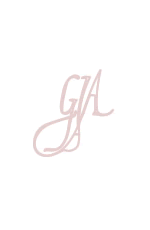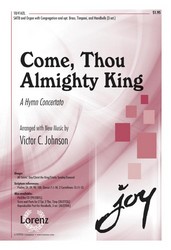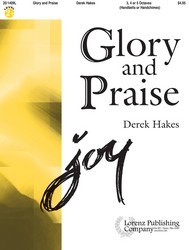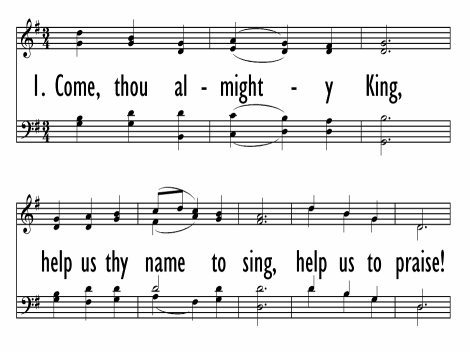- |
User Links
Come, Thou Almighty King

Come, Thou Almighty King, Help us Thy name to sing
Author: C. Wesley; Author: Anonymous (1757)Tune: ITALIAN HYMN
Published in 1852 hymnals
Printable scores: PDF, MusicXMLPlayable presentation: Lyrics only, lyrics + musicAudio files: MIDI, Recording
Representative Text
1 Come, Thou Almighty King,
help us Thy name to sing;
help us to praise:
Father, all glorious,
o'er all victorious,
come, and reign over us,
Ancient of Days.
2 Come, Thou Incarnate Word,
gird on Thy mighty sword,
our pray'r attend:
come, and Thy people bless,
and give Thy Word success:
Spirit of holiness,
on us descend.
3 Come, Holy Comforter,
Thy sacred witness bear
in this glad hour:
Thou who almighty art,
now rule in every heart,
and ne'er from us depart,
Spirit of pow'r.
4 To Thee, great One in Three,
eternal praises be
hence, evermore.
His sov'reign majesty
may we in glory see,
and to eternity
love and adore!
Source: Psalms and Hymns to the Living God #158
Author: C. Wesley
 Charles Wesley, M.A. was the great hymn-writer of the Wesley family, perhaps, taking quantity and quality into consideration, the great hymn-writer of all ages. Charles Wesley was the youngest son and 18th child of Samuel and Susanna Wesley, and was born at Epworth Rectory, Dec. 18, 1707. In 1716 he went to Westminster School, being provided with a home and board by his elder brother Samuel, then usher at the school, until 1721, when he was elected King's Scholar, and as such received his board and education free. In 1726 Charles Wesley was elected to a Westminster studentship at Christ Church, Oxford, where he took his degree in 1729, and became a college tutor. In the early part of the same year his religious impressions were much deepene… Go to person page >
Charles Wesley, M.A. was the great hymn-writer of the Wesley family, perhaps, taking quantity and quality into consideration, the great hymn-writer of all ages. Charles Wesley was the youngest son and 18th child of Samuel and Susanna Wesley, and was born at Epworth Rectory, Dec. 18, 1707. In 1716 he went to Westminster School, being provided with a home and board by his elder brother Samuel, then usher at the school, until 1721, when he was elected King's Scholar, and as such received his board and education free. In 1726 Charles Wesley was elected to a Westminster studentship at Christ Church, Oxford, where he took his degree in 1729, and became a college tutor. In the early part of the same year his religious impressions were much deepene… Go to person page >Author: Anonymous
In some hymnals, the editors noted that a hymn's author is unknown to them, and so this artificial "person" entry is used to reflect that fact. Obviously, the hymns attributed to "Author Unknown" "Unknown" or "Anonymous" could have been written by many people over a span of many centuries. Go to person page >Text Information
Related Texts
| First Line: | Come, Thou Almighty King, Help us Thy name to sing |
| Title: | Come, Thou Almighty King |
| Author: | Anonymous (1757) |
| Author: | C. Wesley |
| Meter: | 6.6.4.6.6.6.4 |
| Source: | English, before 1760; Source unknown, c. 1757, alt. |
| Language: | English |
| Notes: | Polish translation: See "Przyjdź, Królu wieczny nasz" |
| Copyright: | Public Domain |
- (hymns)
- (hymns)
- (hymns)
- (hymns)
- (hymns)
- (hymns)
- (hymns)
- (hymns)
- (hymns)
- (hymns)
- (hymns)
- (hymns)
- (hymns)
- (hymns)
- (hymns)
- (hymns)
- (hymns)
- (hymns)
- (hymns)
- (hymns)
- (hymns)
- (hymns)
- (hymns)
- (hymns)
- (hymns)
- (hymns)
- (hymns)
- (hymns)
- (hymns)
- (hymns)
- (hymns)
- (hymns)
- (hymns)
- (hymns)
- (hymns)
- (hymns)
- (hymns)
- (hymns)
- (hymns)
- (hymns)
- (hymns)
- (hymns)
- (hymns)
- (hymns)
- (hymns)
- (hymns)
- (hymns)
- (hymns)
- (hymns)
- (hymns)
- (hymns)
- (hymns)
- (hymns)
- Year A, Holy Week season, Monday of Holy Week
This is recommended for Year A, Holy Week season, Monday of Holy Week by 2 hymnal lectionary indexes including Lift Up Your Hearts: psalms, hymns, and spiritual songs #492. - Year A, Easter season, Sixth Sunday
Related to John 14 (NPM) - Year A, Ordinary Time, Proper 9 (14)
- Year A, Ordinary Time, Proper 16 (21)
- Year B, Christmas season, Holy Name of Jesus (Mary, Mother of God)
- Year B, Christmas season, New Year's Day
- Year B, Holy Week season, Monday of Holy Week
- Year B, Holy Week season, Monday of Holy Week
This is recommended for Year B, Holy Week season, Monday of Holy Week by 2 hymnal lectionary indexes including Lift Up Your Hearts: psalms, hymns, and spiritual songs #492. - Year B, Easter season, Day of Pentecost
- Year B, Easter season, Day of Pentecost
This is recommended for Year B, Easter season, Day of Pentecost by 2 hymnal lectionary indexes including Lift Up Your Hearts: psalms, hymns, and spiritual songs #492. - Year B, Ordinary Time, Trinity Sunday
This is recommended for Year B, Ordinary Time, Trinity Sunday by 3 hymnal lectionary indexes including Glory to God: the Presbyterian Hymnal #2 and Lift Up Your Hearts: psalms, hymns, and spiritual songs #492. - Year B, Ordinary Time, Proper 9 (14)
- Year B, Ordinary Time, Proper 29 (34)
This is recommended for Year B, Ordinary Time, Proper 29 (34) by 2 hymnal lectionary indexes including Lift Up Your Hearts: psalms, hymns, and spiritual songs #492. - Year C, Christmas season, Holy Name of Jesus (Mary, Mother of God)
- Year C, Christmas season, New Year's Day
- Year C, Holy Week season, Monday of Holy Week
- Year C, Holy Week season, Monday of Holy Week
This is recommended for Year C, Holy Week season, Monday of Holy Week by 2 hymnal lectionary indexes including Lift Up Your Hearts: psalms, hymns, and spiritual songs #492. - Year C, Ordinary Time, Trinity Sunday
- Year C, Ordinary Time, Trinity Sunday
This is recommended for Year C, Ordinary Time, Trinity Sunday by 2 hymnal lectionary indexes.
English
- 112 Familiar Hymns and Gospel Songs #58
- A Book of Hymns and Tunes: for the Sunday-School, the Congregation and Home: 2nd ed. #56
- A Book of Hymns for Public and Private Devotion (15th ed.) #480
- A Book of Hymns for Public and Private Devotion. (10th ed.) #480
- A Book of Song and Service: for Sunday school and home #45
- A Book of Worship for the Use of the Evangelical Lutheran Church ... of the Church of the Redeemer, Richmond, Virginia #d23
- A Calendar of Hymns #d9
- A Choice Collection of Hymns, in which are some never before printed #CXLIX
- A Chord #d12
- A Collection of Divine Hymns from Various Authors #d8 10 shown out of 1250
Latin
Spanish
Welsh
Notes
Scripture References:
st.3 = John 15:26
The anonymous text dates from before 1757, when it was published in a leaflet and bound into the 1757 edition of George Whitefield's Collection of Hymns for Social Worship. The text appears to be patterned after the British national anthem, "God Save the King." Filled with names for members of the Godhead, this song exhibits a common trinitarian structure, addressing God the Father (st. 1), God the Son (st. 2), and God the Holy Spirit (st. 3), concluding with a doxology to the Trinity (st. 4).
The text has often been attributed to Charles Wesley, since the leaflet also included a hymn text from his pen (“Jesus, Let Thy Pitying Eye"); however, "Come, Thou Almighty King" was never printed in any of the Wesley hymnals, and no other Wesley text is written in such an unusual mete
Liturgical Use:
Beginning of worship; as a doxology (st.4)
--Psalter Hymnal Handbook
===================
Come, Thou Almighty King. [Holy Trinity.] The earliest form in which this hymn is found is in 5 stanzas of 7 lines, with the title, "An Hymn to the Trinity," on a tract of four pages, together with stanzas 1, 2, 6, 10, 11, and 12, of C. Wesley's hymn on "The Backslider," beginning "Jesus, let Thy pitying eye," &c, thus making up a tract of two hymns. The date of this tract is unknown. It is bound up with the British Museum copy of the 6th ed. of G. Whitefield's Collection, 1757, and again with the copies in the same library of the 8th ed., 1759, and the 9th, 1760. In subsequent editions beginning with the 10th, 1761, both hymns were incorporated in the body of the book. M. Madan included it in the Appendix to his Collection in 1763, No. cxcv., and through this channel, together with the WhitefieldCollection, it has descended to modern hymnals. The loss of the titlepage (if any) of the above tract renders the question of its authorship one of some doubt. The first hymn in the tract is compiled, as indicated, from C. Wesley's hymn, "Jesus, let Thy pitying eye," which appeared in his Hymns & Sacred Poems, 1749, some eight years before the abridged form was given in G. Whitefield’s Collection. The hymn, "Come, Thou Almighty King," however, cannot be found in any known publication of C. Wesley, and the assigning of the authorahip to him is pure conjecture. Seeing that it is given, together with another hymn, at the end of some copies of the 6th, 8th and 9th ed. of Whitefield's Collection (1757, 1759 and 1760), and was subsequently em¬bodied in that Collection, the most probable conclusion is that both hymns were printed by Whitefield as additions to those editions of his collection, and that, as in the one case, the hymn is compiled from one by C. Wesley, so in this we have probably the reprint of the production of an author to us as yet unknown. Much stress has been laid on the fact that the late D. Sedgwick always maintained the authorship of C. Wesley, and that from his decision there was no appeal. The "S. MSS." show clearly that (1) Sedgwick's correspondence respecting this hymn was very extensive; (2) that he knew nothing of the British Museum copies noted above; (3) that he had no authority for his statement but his own private opinion Based on what he regarded as internal evidence alone; (4) and that all the Wesleyan authorities with whom he corresponded, both in G. Britain and America, were against him. His authority is, therefore, of no value. The evidence to the present time will admit of no individual signature. It is "Anon.”
The use of this hymn, both in Great Britain, the Colonies, and America, is very extensive. It has also been rendered into various languages. Original text, Lyra Britannica, 18G7, p. 656; Snepp's Songs of Grace & Glory, 1872.
--John Julian, Dictionary of Hymnology (1907)
Access an additional article on the Canterbury Dictionary of Hymnology:
Tune
ITALIAN HYMNFelice de Giardini (b. Turin, Italy, 1716; d. Moscow, Russia, 1796) composed ITALIAN HYMN in three parts for this text at the request of Selina Shirley, the famous evangelically minded Countess of Huntingdon. Giardini was living in London at the time and contributed this tune and three others to Mar…
For Leaders
“His Sovereign majesty May we in glory see.”
Text:
“Come, Thou Almighty King” is an anonymous text that first appeared in print in a short pamphlet published by the Wesleys alongside one of Charles Wesley’s hymns. The British Museum contains a copy of this pamphlet bound with the 1757 edition of George Whitefield’s Collection of Hymns for Social Worship, as well as two later editions from 1759 and 1760. The fact that it appeared with Wesley’s hymn has led some to believe that Wesley wrote it, but this is doubtful. The hymn does not appear in any of the older Methodist hymnals, and Wesley never claimed it, nor did he write another hymn in the unusual meter of this one.
Similarities between “Come, Thou Almighty King” and the British national anthem “God Save the King” suggest that the hymn was written as a parody to that national anthem. There is a story that, during the American Revolution, some British soldiers surprised an American congregation on Long Island and ordered them to sing “God Save the King.” The Americans responded by singing the correct tune, but the words of “Come, Thou Almighty King.”
This text was written with five stanzas. The original second stanza, which addresses Jesus as our great military leader, is always omitted, but sometimes it is combined with the original third stanza. The four stanzas that remain contain other militaristic language, which is sometimes edited. Each of the first three stanzas is addressed to a member of the Trinity: God the Father (st. 1, fourth line), the Son (the “incarnate word,” opening line of st. 2), and the Holy Spirit (“holy comforter, opening line of st. 3). The fourth stanza concludes with a doxology to the Trinity.
Tune:
This text was originally sung to the tune of the British national anthem (known now in the U.S. as AMERICA). In 1769, a new tune was written especially for this text for Martin Madan’s A Collection of Psalm-Tunes never published before, a music book sold to benefit the Lock Hospital, a London charitable institution. One of the hospital’s patrons, Selina Hastings, Countess of Huntingdon, had asked Felice de Giardini, a popular Italian composer living in London, to write a new tune for these words, and ITALIAN HYMN was the result. Madan, the hospital’s chaplain, included the tune in his collection, and it became popular.
ITALIAN HYMN is so named because its composer was an Italian living in England. It is also known as MOSCOW, after the city where Giardini died, or TRINITY, after the theme of the hymn. Other uncommon names include FAIRFORD, FLORENCE, GIARDINI'S, or HERMAN.
When/Why/How:
For general use, this hymn is suitable for the opening of worship, or as a doxology. A couple of Sundays where it is especially appropriate are Trinity Sunday and Pentecost (with the focus on stanza 4).
“Come, Thou Almighty King” for handbells by Kevin McChesney has an interesting rhythmic underpinning all the way through. Victor Johnson has written a majestic concertato setting of “Come, Thou Almighty King” for choir, congregation, and organ, with optional brass, timpani, and handbell parts. Another setting of “Come, Thou Almighty King” by Michael Burkhardt alternates between the fully orchestrated use of the popular tune ITALIAN HYMN and an a capella rendering of the lesser-known tune NEW HAVEN. Lloyd Larson’s piano suite “Jesus Shall Reign” contains a classical prelude setting of ITALIAN HYMN.
Tiffany Shomsky, Hymnary.org
Timeline
Arrangements
Media
Psalter Hymnal (Gray) #246
The Rural harmony: being an original composition, in three and four parts ; for the use of singing schools and musical societies #18
The United Methodist Hymnal #61
The United Methodist Hymnal #61b
- Bulletin Score (melody only) (PDF)
- MIDI file from Baptist Hymnal 1991 #247
- MIDI file from Baptist Hymnal 1991 #247
- MIDI file from The Cyber Hymnal #9780
- Audio recording from The Hymnal 1982: according to the use of the Episcopal Church #365
- Audio recording from Evangelical Lutheran Worship #408
- Audio recording from Glory to God: the Presbyterian Hymnal #2
- Audio recording from Lift Up Your Hearts: psalms, hymns, and spiritual songs #492
- Audio recording from Lift Up Your Hearts: psalms, hymns, and spiritual songs #492
- Audio recording from Lift Up Your Hearts: psalms, hymns, and spiritual songs #492
- Audio recording from Lift Up Your Hearts: psalms, hymns, and spiritual songs #492
- Audio recording from Lift Up Your Hearts: psalms, hymns, and spiritual songs #492
- Audio recording from The Presbyterian Hymnal: hymns, psalms, and spiritual songs #139
- MIDI file from Psalter Hymnal (Gray) #246
- MIDI file from Psalter Hymnal (Gray) #246
- Audio recording from The Rural harmony: being an original composition, in three and four parts ; for the use of singing schools and musical societies #18
- Audio recording from Small Church Music #266
- Audio recording from Small Church Music #266
- Audio recording from The Southern Harmony, and Musical Companion (New ed. thoroughly rev. and much enl.) #159b
- MIDI file from The Southern Harmony, and Musical Companion (New ed. thoroughly rev. and much enl.) #159b
- Audio recording from Trinity Hymnal (Rev. ed.) #101
- MIDI file from Timeless Truths #792
- MIDI file from Urania: or a choice collection of psalm-tunes, anthems, and hymns, from the most approv'd authors, with some entirely new; in two, three, and four parts... #190
- MIDI file from The United Methodist Hymnal #61
- Audio recording from The United Methodist Hymnal #61
- Audio recording from The United Methodist Hymnal #61b
- Audio recording from Worship and Rejoice #148
- MIDI file from Worship and Rejoice #148
- MIDI file from Worship in Song: A Friends Hymnal #7
- Audio recording from Worship (4th ed.) #549


 My Starred Hymns
My Starred Hymns






